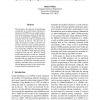Free Online Productivity Tools
i2Speak
i2Symbol
i2OCR
iTex2Img
iWeb2Print
iWeb2Shot
i2Type
iPdf2Split
iPdf2Merge
i2Bopomofo
i2Arabic
i2Style
i2Image
i2PDF
iLatex2Rtf
Sci2ools
133
click to vote
NAACL
2010
2010
Optimal Parsing Strategies for Linear Context-Free Rewriting Systems
Factorization is the operation of transforming a production in a Linear Context-Free Rewriting System (LCFRS) into two simpler productions by factoring out a subset of the nonterminals on the production's righthand side. Factorization lowers the rank of a production but may increase its fan-out. We show how to apply factorization in order to minimize the parsing complexity of the resulting grammar, and study the relationship between rank, fanout, and parsing complexity. We show that it is always possible to obtain optimum parsing complexity with rank two. However, among transformed grammars of rank two, minimum parsing complexity is not always possible with minimum fan-out. Applying our factorization algorithm to LCFRS rules extracted from dependency treebanks allows us to find the most efficient parsing strategy for the syntactic phenomena found in non-projective trees.
Related Content
| Added | 14 Feb 2011 |
| Updated | 14 Feb 2011 |
| Type | Journal |
| Year | 2010 |
| Where | NAACL |
| Authors | Daniel Gildea |
Comments (0)

